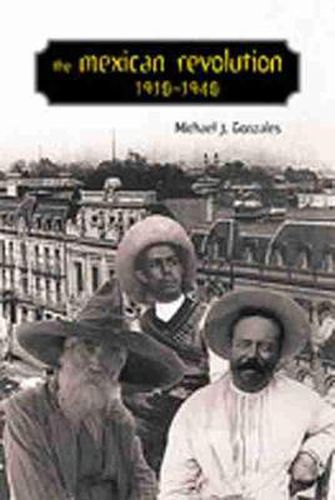Readings Newsletter
Become a Readings Member to make your shopping experience even easier.
Sign in or sign up for free!
You’re not far away from qualifying for FREE standard shipping within Australia
You’ve qualified for FREE standard shipping within Australia
The cart is loading…






This judicious history of modern Mexico’s revolutionary era will help all readers, and in particular students, understand the first great social uprising of the twentieth century. In 1911, land-hungry peasants united with discontented political elites to overthrow General Porfirio Diaz, who had ruled Mexico for three decades. Gonzales offers a path-breaking overview of the revolution from its origins in the Diaz dictatorship through the presidency of radical General Lazaro Cardenas (1934-1940) drawn from archival sources and a vast secondary literature. His interpretation balances accounts of agrarian insurgencies, shifting revolutionary alliances, counterrevolutions, and foreign interventions to delineate the triumphs and failures of revolutionary leaders such as Francisco I. Madero, Pancho Villa, Emiliano Zapata, Alvaro Obregon, and Venustiano Carranza. What emerges is a clear understanding of the tangled events of the period and a fuller appreciation of the efforts of revolutionary presidents after 1916 to reinvent Mexico amid the limitations imposed by a war-torn countryside, a hostile international environment, and the resistance of the Catholic Church and large landowners.
$9.00 standard shipping within Australia
FREE standard shipping within Australia for orders over $100.00
Express & International shipping calculated at checkout
This judicious history of modern Mexico’s revolutionary era will help all readers, and in particular students, understand the first great social uprising of the twentieth century. In 1911, land-hungry peasants united with discontented political elites to overthrow General Porfirio Diaz, who had ruled Mexico for three decades. Gonzales offers a path-breaking overview of the revolution from its origins in the Diaz dictatorship through the presidency of radical General Lazaro Cardenas (1934-1940) drawn from archival sources and a vast secondary literature. His interpretation balances accounts of agrarian insurgencies, shifting revolutionary alliances, counterrevolutions, and foreign interventions to delineate the triumphs and failures of revolutionary leaders such as Francisco I. Madero, Pancho Villa, Emiliano Zapata, Alvaro Obregon, and Venustiano Carranza. What emerges is a clear understanding of the tangled events of the period and a fuller appreciation of the efforts of revolutionary presidents after 1916 to reinvent Mexico amid the limitations imposed by a war-torn countryside, a hostile international environment, and the resistance of the Catholic Church and large landowners.